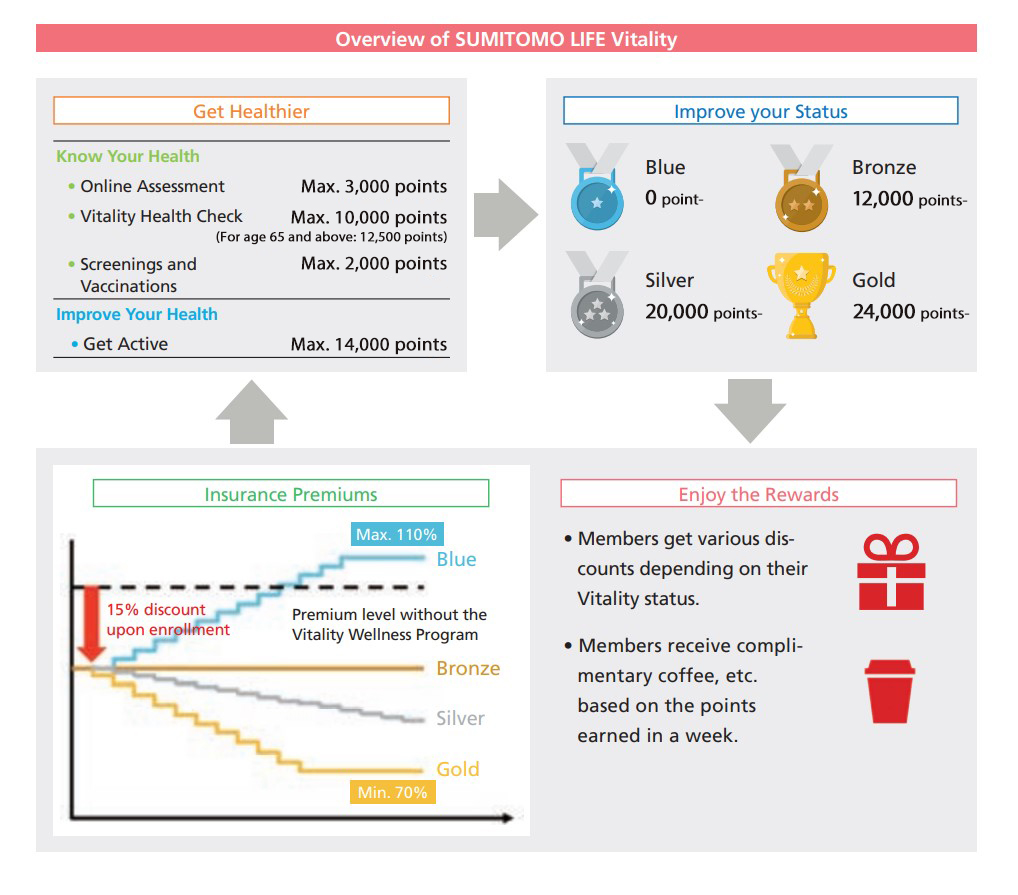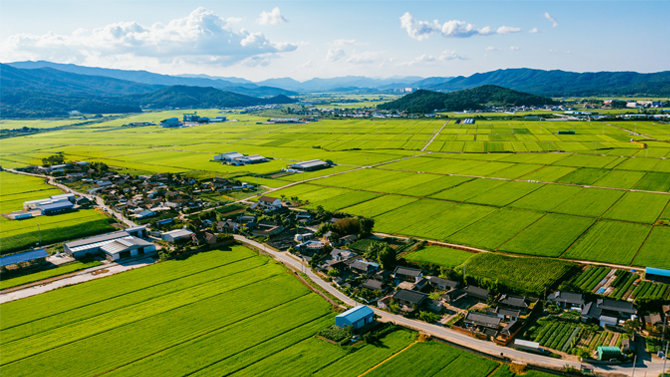Social Issues addressed by Sumitomo —Compass for the Future—
Realizing “healthy lifestyles” and “safe and secure living”
Supporting a society of affluence, vitality, health and longevity through life insurance products
 Wellness
Wellness Regional revitalization
Regional revitalizationSumitomo Life Insurance positions its Management Policy, a corporate philosophy expressing the fundamental spirit of management, at the apex of its operating policy. Whereas the Sustainability Management Policy stipulates the company’s universal mission stated in the Management Policy from the sustainability perspective, the Sumitomo Life Brand Vision articulates the image of the company that Sumitomo Life Insurance aspires to become over the medium to long term from the customer’s perspective.
In accordance with the Sumitomo Life Medium-Term Business Plan 2022, the company is helping to achieve the SDGs by contributing to a society in which good health and longevity are the norms through the promotion of SUMITOMO LIFE Vitality.
Vitality, developed by Discovery Ltd., a South African financial services company, is an innovative insurance service that includes a health promotion program. Prompted by a desire to help people live healthier, more fulfilling, safe and secure lives, Vitality was launched in 1997 in South Africa. Vitality is currently available in 36 countries and regions worldwide, with approx. 27.1 million members as of February 1, 2022. Sumitomo Life Insurance is the sole life insurance company with the right to market Vitality in Japan. Since the launch of SUMITOMO LIFE Vitality in July 2018, sales of this product have been increasing year by year, with cumulative sales exceeding 1 million policies in fiscal 2021.

Sumitomo Life Insurance Vitality combines the Vitality Wellness Program, which supports health promotion through evaluation of health-enhancing activities and the granting of various rewards to reduce the risk of illness etc., with an insurance policy covering hospitalization, surgery, and loss of earnings due to injury or illness. In March 2022, the company began offering the Vitality Health Report, in which the risk of hospitalization is quantified as a “health score” based on the results of health checkups and the positioning of the insured is indicated in relation to other insured people of the same sex and demographic.
A questionnaire survey of Vitality members conducted in 2021 revealed that 89% of respondents had become more conscious of health since becoming Vitality members. Moreover, a survey of the number of steps taken by Vitality members and their health checkup results indicate an 11% increase in the number of steps taken per day. Moreover, 52% of Vitality members with high blood pressure experienced a decrease of at least 10mmHg in blood pressure. Many Vitality members responded that their quality of life had improved. A study found that the mortality rate of Vitality members is about 40% lower than that of non-members, and the hospitalization rate is about 10% lower.
Making a distinction between the insurance policy and SUMITOMO LIFE Vitality, Sumitomo Life Insurance has been offering elements of the Vitality Wellness Program, free of charge, for a limited period of time. Currently, two principal versions are offered. Whereas the trial version is offered to individuals via sales representatives, the corporate version is available for company employees as a facet of Sumitomo Life Insurance support for companies promoting health-focused management. In addition, Sumitomo Life Insurance is promoting projects in collaboration with local governments to encourage local residents to embrace behavioral changes beneficial to their health. For example, in April 2022, the company launched the Yamagata City Vitality Walk project with Yamagata City in Yamagata Prefecture, utilizing elements of the Vitality Wellness Program to promote the health of local residents.

Japan is now a super-aging society, with the number of people aged 75 or older forecast to increase to 22.9 million (19.2% of the population) by 2030. The incidence of dementia also increases among those aged 75 or older. Sumitomo Life Insurance established the 100-year Lifespan Support Council, which is a cross-departmental organization, and formulated the Guidelines for Fulfilling Roles in a Super-aging Society in January 2021 to promote a unified company-wide response to the elderly and the super-aging society.
Mindful of the advent of an era in which a 100-year lifespan is no longer an outlier, and furthermore, in light of such factors as diversifying lifestyles and changes in medical services, Sumitomo Life Insurance will work to resolve social issues of the super-aging society in order to realize the “healthy lifestyles” and “safe and secure living” that are required for a society of affluence, vitality, health and longevity. The company has also established a system to ensure all its employees are well-informed about the needs of the elderly and the super-aging society and thus able to respond effectively to customers. The company is encouraging all its employees to take gerontology examinations and is offering lectures by experts and various other training programs. The initial training curriculum for Sumisei Life Designers, that is, for Sumitomo Life Insurance sales staff, includes a dementia supporter training course.
To assist customers who are experiencing cognitive decline and to help ensure a safe and secure social environment, Sumitomo Life Insurance is also promoting the development of relationships with community comprehensive support centers, which assist the elderly by facilitating access to long-term care, healthcare, insurance, and welfare. The company is strengthening its ties with local communities by participating in activities to support the care of the elderly and in community events. It is also supporting initiatives such as the National Health and Welfare Festival, commonly known as Nenrinpic, an annual event encompassing sports, culture, health, and welfare primarily for the elderly that the Ministry of Health, Labour and Welfare holds with the cooperation of prefectures and the Foundation of Social Development for Senior Citizens.


Read about initiatives to achieve a low-carbon society, aiming at net-zero greenhouse gas emissions since these emissions are implicated in global warming.

In view of ongoing globalization and the growing complexity of supply chains, companies need to respond appropriately to issues in supply chains.

The pace of workstyle reform is accelerating as the COVID-19 pandemic has prompted numerous companies to embrace novel ways of working.

For companies, the COVID-19 pandemic has brought the crucial importance of employee health into sharp focus.

Accelerating global warming poses serious business risks. Accordingly, companies need to formulate strategies and implement specific countermeasures from a medium- to long-term perspective.

Spurred by efforts to reduce environmental impacts and in line with increasing social needs, replacement of gasoline-powered vehicles with electric vehicles is accelerating.

Vigorous initiatives are afoot to tackle social issues by revitalizing communities and the interpersonal relationships that bind them together.

Poverty persists in contemporary Japan and the existence of child poverty is a grave concern.

In view of the continuing decline of Japan’s working age population, due to population aging coupled with a low birthrate, development of the next generation is an urgent issue.

The rapid progress in medicine in recent years is largely due to the efforts of not only universities and other research institutions but also of companies to develop cutting-edge technologies.

Numerous initiatives to promote industry and commerce at the regional and community level are underway, involving the use of renewable energy and thus contributing to decarbonization.

One-third of food produced is lost or wasted globally, amounting to about 1.3 billion tons per year. Food loss and waste is a pressing issue in need of a solution.

Companies are addressing a wide range of issues so that people and companies can coexist in harmony with the global environment.

In addition to natural disasters, there are various types of hazards whose nature, incidence and severity are changing with the times. Resilience and flexibility are indispensable in dealing with them.

Read about initiatives to achieve sustainable regional revitalization. The attributes and resources that each region can offer are leveraged to strengthen local economies and overcome the problem of population decline.